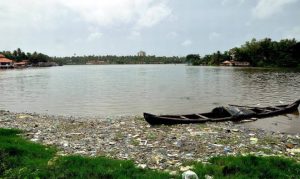Another Man vs Environment Conflict: Kerala’s Ashtamudi Lake
Construction of bridges over the Ashtamudi Lake in the Ashramam Link Road Extension Project will lead to further destruction of the lake’s ecosystem.

Although industrialisation has often been blamed for environmental degradation, far less research has gone on the ill-effects of rapid urbanisation. Recently, a group of researchers from France and Israel have disproved the conventional belief that cities before industrialisation were sustainable. According to a paper published in Natural Scientific Report urban expansion, even during ancient and medieval times, has left lasting ecological impact.
For instance, the expansion of city of Akko, in modern day Israel, saw rapid urbanisation owing to its abundance of resources almost 4,000 years before present, ultimately leading to large-scale disappearance of forests; the construction of stone buildings and the increased demand for fresh water; which ultimately led to increase in the temperatures. The cities of today, which are expanding at a far greater pace, can expect a similar, if not worse, fate.
Also read: Rebuilding Kerala: UN PDNA exercise to not count just damage, but rebuild better
Ashtamudi Lake, in Kerala can be another such example. The lake is suffering from the effects of mismanaged urbanisation of the district of Kollam which surrounds it. Over the years, the lake has shrunk to almost half its size from 64 sq. km to 34 sq. km. Although, it was added to the list of Ramsar Conserved sites in 2002, the condition has only deteriorated since.
“In the decade that followed its inclusion in the conserved status, the lake has lost 27 sq. km due to encroachments. The water quality has continuously gotten worse with the dissolved oxygen content falling and nitrates and phosphate levels increasing. The consequent effect on the biological bio-diversity has severely affected the livelihood of thousands of fishermen.”
In 2016, the Ministry of Environment, Forest and Climate Change, Government of India was directed by the Kerala High Court to form a team of experts to submit recommendations to improve the condition of the lake. The report recommended construction of an effluent treatment plant within 12 months to check the discharge from Victoria Hospital and District Hospital. Moreover, it recommended the construction of a modern slaughterhouse as it identified the old slaughterhouse as one of the main culprits of the pollution.

Almost two years thence, the sewage treatment plant proposed to save Ashtamudi Lake is far from completion and the idea of a modern slaughterhouse is on the shelf.
A writ petition filed by Rahul V.I., an environmentalist, in the High Court of Kerala points to another project which would lead to further destruction of the lake. The public interest litigation, filed through the counsels Raghul Sudheesh and Lakshmi J, prays for a grant of stay on the Ashramam Link Road Extension Phase III and IV. The project aims to connect KSRTC bus terminal to Thoppilkadavu which is one of the neighbourhoods of Kollam located on the shores of the lake. The petition states that it would involve the construction of bridges over the Ashtamudi Lake leading to further destruction of the lake’s ecosystem. It is the argument of the petitioner that the project would turn redundant with the completion of NH bypass from Kavanad in the north to Mevaram in the south in December 2018 and it is only a ‘short sighted’ ploy by the government. The court has issued notice in the matter and it now awaits the reply from the respondents which includes both the Centre and State government.
“As the court reviews the environmental impact of the project, a balance needs to be struck between the needs of the city and the environmental impact of these needs.”
In a country staring at transition from its agrarian economy, urbanisation is an inevitable consequence with both positive and negative impacts. Urbanisation is linked with a fall in fertility rates reducing the population growth rate in the developing countries, which in turn could lead to a higher per-capita GDP. Thus, a project’s environmental impact needs to be justified by its necessity.
Also read: Tripura, West Bengal won’t repeat in Kerala: Premachandran
Regardless of the outcome of the case, some degree of environmental damage has already been done as pillars have been piled and erected in the lake for Phase III extension. With the lake in bad shape, the state government has expressed its desire on making Ashtamudi a tourist spot in an effort to support the cause of reviving it. However, as long as major projects like the sewage treatment plant are still pending, the condition of the lake is unlikely to get better anytime soon
